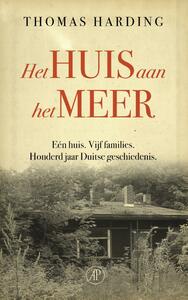You need to sign in or sign up before continuing.
Take a photo of a barcode or cover
emotional
hopeful
reflective
medium-paced
emotional
informative
reflective
medium-paced
emotional
informative
inspiring
reflective
medium-paced
This would be such a great way to introduce the timeframe of WW2, to the Berlin wall and beyond. Their is website also that shows pictures of the house and the rebuilding of it into a center for Education and Reconciliation, which is really interesting.
The story of a summer house on one of the lakes southwest of Berlin, spanning the 20s to the present day. An interesting way to describe the history of what became East Germany (the Wall was built between the house and the lake, with the house being on the Eastern side). Originally built by a well-off Jewish family, who managed to escape to Britain. The house survives expropriations, abandonments, collective management, and squatters, leaving memories and a tangled legal web.
This could have gone so wrong. Instead it offers a fascinating history of Berlin in the 20th century.
A fascinating read in which the house ends up representing a metaphor for the experiences of Germany in the 20th century. Initially as the facts unfold, it seemed incredible that the house could be involved in so many events representative of wider political events in the country. But as I read, I began to realise that actually the story is more that, as a completely normal, unimportant house, the fact that so many major events touched it is more a measure of the degree to which the massive political upheavals that Germany sustained throughout the 20th century were more universal in nature, with no home, or family untouched by the terrible succession of events.
Thus we read of an affluent Jewish family forced from the house by the rise of Nazism, it's subsequent ownership by an SA officer, himself swept up in the Night of the Long Knives purge, through a music publisher who represents the face of casual collaboration with Nazi rule. As the Berlin Wall rises up, quite literally through the garden of the house and the East West split hardens, the house is occupied by a Stasi informer, before after reunification, the long trajectory of contested ownership are played out in the campaign to save the house from demolition.
This is not a heavy historical book, I would not recommend reading it to learn in any detail about the events affecting Germany over this period - indeed, at times, the history is almost casually thrown about without underpinning evidence (albeit there are substantive notes at the end) - but this is not a criticism, because the book sets out to be a human history, one rooted in people's lived lives, not an academic text (plenty books exist for that angle). As a snapshot of the national traumas that Germany endured, and the sense of hope that emerged from that process, the book succeeds wonderfully.
Thus we read of an affluent Jewish family forced from the house by the rise of Nazism, it's subsequent ownership by an SA officer, himself swept up in the Night of the Long Knives purge, through a music publisher who represents the face of casual collaboration with Nazi rule. As the Berlin Wall rises up, quite literally through the garden of the house and the East West split hardens, the house is occupied by a Stasi informer, before after reunification, the long trajectory of contested ownership are played out in the campaign to save the house from demolition.
This is not a heavy historical book, I would not recommend reading it to learn in any detail about the events affecting Germany over this period - indeed, at times, the history is almost casually thrown about without underpinning evidence (albeit there are substantive notes at the end) - but this is not a criticism, because the book sets out to be a human history, one rooted in people's lived lives, not an academic text (plenty books exist for that angle). As a snapshot of the national traumas that Germany endured, and the sense of hope that emerged from that process, the book succeeds wonderfully.
This is creative narrative nonfiction text. It’s amazing to look at history through the lens of a house. I only wish there was more information about the history that happened—the back matter focused more on the families.
informative
medium-paced
One of my all-too-rare forays into nonfiction. Although the writing is a bit "pedestrian" the subject was right up my alley. They book documents twentieth century German history through the history of a singal house, constructed on a lake in the 1920s as a weekend home for a Berlin Jewish doctor and his family, it changes hands multiple times - and each resident's story reflected the socio-political craziness of succeeding eras. The transition from Nazi Germany to Communist East Germany was fascinating, especially the de-natzification process and how futile that effort was. The lakefront home was ultimately completely separated from the lake by extension of the East-West wall from Berlin. Ultimately it was occupied by squatters and drug addicts, and then abandoned until the great-grandson of the original Jewish owner sought it out and organized to have it restored from decay and declared a building of historical interest. It's now an educational center/museum!
adventurous
emotional
informative
reflective
slow-paced
definitely slow/drawn out at points but it paints a really excellent picture of life over 100 years.



